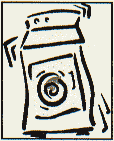
BASQUE COUNTRY/NAVARRA
HOUSEWORK = HARD WORK
Are you fit enough to work at home? Heavy shopping bags, high
shelves.
 According to a study carried out by Ofyde
and presented by Emakunde, housework "is something between difficult and
laborious, with a high risk of aches and injuries in the medium and long
term."Last year. the High Court of the Basque Country (TSJPV) ruled against
allowing Juana Mo-reno, a housemaid, permanent sick leave. The judge alleged
that "many daily chores* According to a study carried out by Ofyde
and presented by Emakunde, housework "is something between difficult and
laborious, with a high risk of aches and injuries in the medium and long
term."Last year. the High Court of the Basque Country (TSJPV) ruled against
allowing Juana Mo-reno, a housemaid, permanent sick leave. The judge alleged
that "many daily chores*
 do not
require physical exertion," and that "those Jobs that require physical effort
are moderate and are done with the aid of mechanical means."The results of the
study have been sent to various bodies, including the TSJPV, unions, the
Industrial Relations Council and the bar association*.Six women from Bizkaia,
with an average age of 47, were chosen to take part in the study. The chores
were selected by the group, being the ones they did most regularly in their
work. Before starting, the group went through fitness do not
require physical exertion," and that "those Jobs that require physical effort
are moderate and are done with the aid of mechanical means."The results of the
study have been sent to various bodies, including the TSJPV, unions, the
Industrial Relations Council and the bar association*.Six women from Bizkaia,
with an average age of 47, were chosen to take part in the study. The chores
were selected by the group, being the ones they did most regularly in their
work. Before starting, the group went through fitness |
 checks to make sure they were in good health. The
chores were carried out at home and in a laboratory.The tasks included i
roning, maki ng and unmaking beds, cleaning windows, hoovering*, hanging out
clothes, cleaning the bathroom, sweeping and mopping floors, cleaning work tops
and kitchen cupboards, and doing the shopping.So as not to "exaggerate the
results," as research head Txema Garcia explained, the workers spent less time
carrying out the tasks than normal. For example, only 30 minutes ironing with
no heavy garments, and a maximum of 4 kilos shopping in each hand done at shops
within 100 metres. Ana Alberdi, in charge of research for Emakunde, pointed out
that one in ten women in employment work in the home, and that of these, some
80% do not have a contract. Is any other work so badly under-valued? ( F
) checks to make sure they were in good health. The
chores were carried out at home and in a laboratory.The tasks included i
roning, maki ng and unmaking beds, cleaning windows, hoovering*, hanging out
clothes, cleaning the bathroom, sweeping and mopping floors, cleaning work tops
and kitchen cupboards, and doing the shopping.So as not to "exaggerate the
results," as research head Txema Garcia explained, the workers spent less time
carrying out the tasks than normal. For example, only 30 minutes ironing with
no heavy garments, and a maximum of 4 kilos shopping in each hand done at shops
within 100 metres. Ana Alberdi, in charge of research for Emakunde, pointed out
that one in ten women in employment work in the home, and that of these, some
80% do not have a contract. Is any other work so badly under-valued? ( F
) |
|||
| |
|
WINDS OF UP TO 140 kph CAUSE FIVE DEATHS, DOZENS OF INJURIES AND CREATE CHAOS |
Bizcaya was the historic territory that suffered the worst effects of the storms that hit Europe at the end of December. Winds of up to 140 kph caused chaos and disruption throughout the Basque Country and Navarra. In Bizcaya the cost was particularly high as four people died in accidents related to the gales*. In Bilbao two pedestrians were crushed* by a crane* that collapsed | and in Barakaldo a metro worker was killed when a hut* fell on him. Another person was killed in Sestao when the wind pushed him in front of a car. In Donostia a pensioner was killed as she was going to celebrate mass. Across the region trees blocked roads, trains couldn't run and airports were closed. More than 200,000 families in the Basque Country didn't have electricity for various hours. (E) |
|
| GuggenheimClicks | Air Tickets| Buy Music | Downloads | Children| Free Games | Yellow Pages | |
| Headlines | Electronics | Buy Videos| Weather| Buy books | Toy and Stuff.. | ||
Copyright © 1999 Amazing Stuff & Co. v